Yearly Check Ups for the Senkwekwe Center Mountain Gorilla Orphans
By Gorilla Doctors Staff on Monday, January 5th, 2015 in Blog.Every year, the mountain gorilla orphans at the Senkwekwe Center in Virunga National Park receive comprehensive medical exams to ensure they remain in good health and have not developed any underlying medical conditions or are in need of veterinary treatment. Most recently, Drs. Jan, Eddy and Martin examined Ndeze and Matabishi at the Senkwekwe Center. Fortunately, both orphan gorillas are in good health!
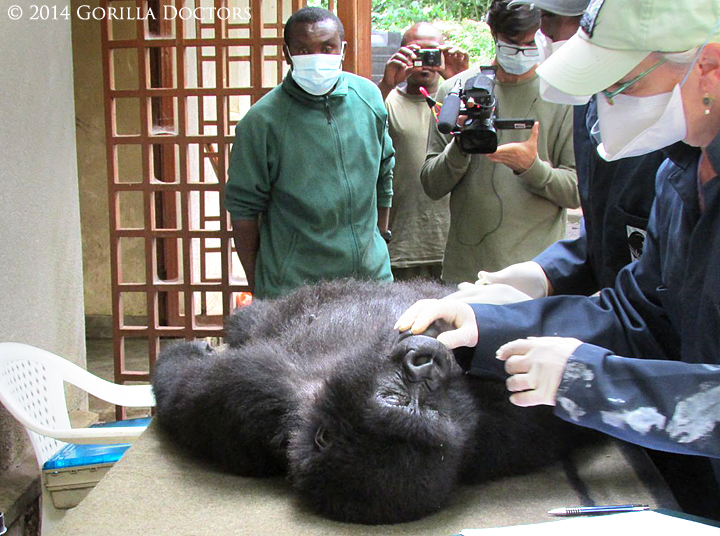
Mountain gorilla orphan Ndeze on the exam table at the Senkwekwe Center.
Ndeze
In late November, 7-year-old Ndeze was reportedly squinting her eyes as if in pain with a reduced activity level. During Dr. Jan’s observation, Ndeze held her eyes at least half closed and held her head while laying down. Though there was white discharge in both eyes, there was no nasal discharge or coughing and her respiratory rate was normal. She was treated for suspected conjunctivitis with triple antibiotic ophthalmic ointment and pain medication and within a few days, her condition was much improved.
During her recent annual health check, Ndeze was very mellow and allowed Dr. Eddy to give her an injection of anesthesia while he held her hand as they sat outside in the enclosure. She fell peacefully asleep and the exam was completed within one hour by the Gorilla Doctors team. Oral, nasal, vaginal and rectal swabs were collected for research and testing, as well as blood, fecal, and urine samples.
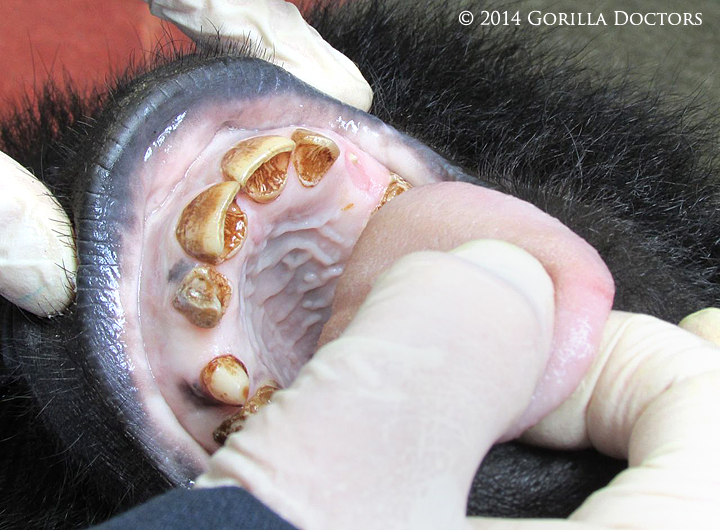
Dr. Jan examines Ndeze’s teeth and gums.
The orphan exams, as well as a routine health check of Bageni group by DRC Head Vet Dr. Eddy, were documented by a French film crew for a show called “Enquête Exclusive”, hosted by anchorman Bernard de la Villardière. (Stay tuned for air dates!)
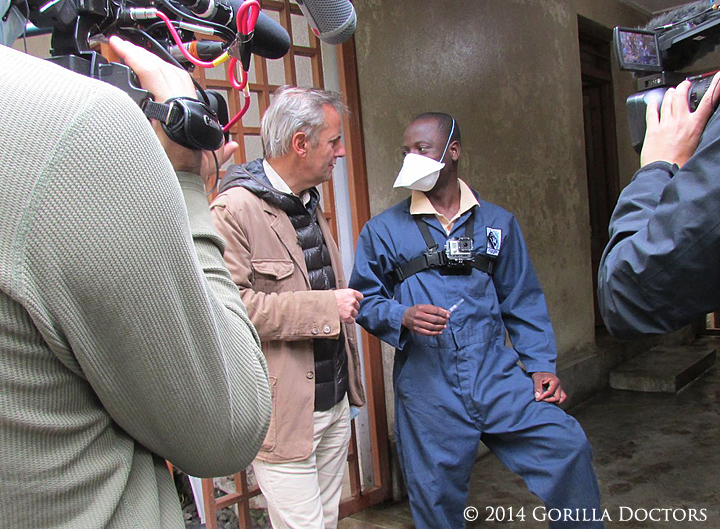
Dr. Martin is interviewed by French anchorman Bernard de la Villardière.
As well, volunteer veterinarian and Murdoch University PhD candidate Dr. Alisa Kubala joined the Gorilla Doctors team to assist with the exams and collect samples for her research on malaria in eastern gorillas. [To learn more about Alisa and her research, click here.
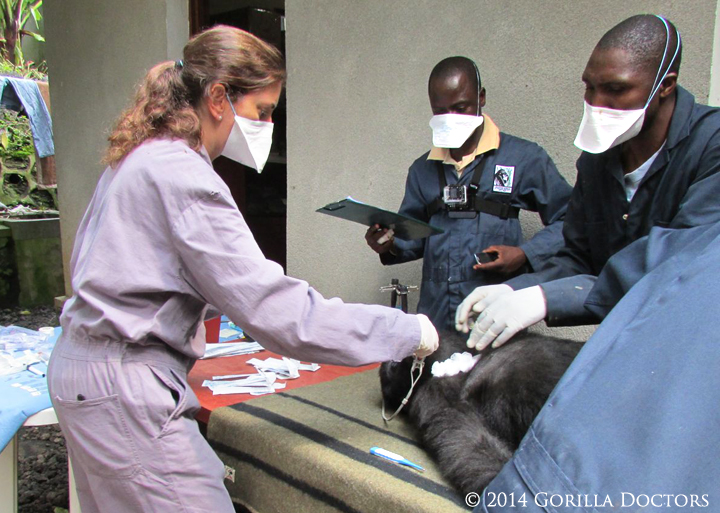
Gorilla Doctors volunteer veterinarian and PhD student Dr. Alisa Kubala helps Drs. Martin and Eddy with Matabishi’s exam.
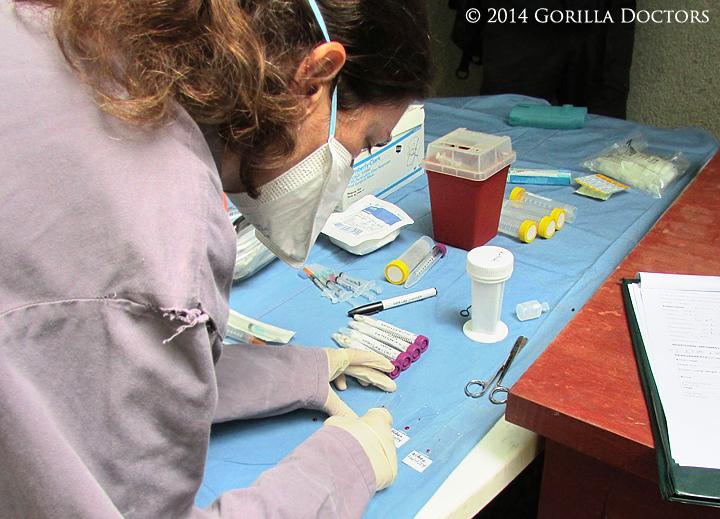
Dr. Alisa records observations and collects samples during the exams.
Matabishi
Infant Matabishi, the newest addition to the Senkwekwe orphan gorilla group, was not as easy to anesthetize for his exam. He was not happy being separated from his surrogate mother, Maisha, so his caretaker, Andre Bauma, held him while Dr. Martin tried to give him his injection of anesthesia. He was quite upset still, so the vets opted to give Matabishi an oral sedative first and then the anesthetic was administered. This was Matabishi’s second full exam under anesthesia since his rescue in June 2013 and fortunately, the youngster has never suffered any major health problem. During his exam, a range of samples were collected and vaccinations for measles, rabies, and polio were administered. The exam did not reveal any underlying health condition and Matabishi continues to grow and thrive at the Senkwekwe Center.
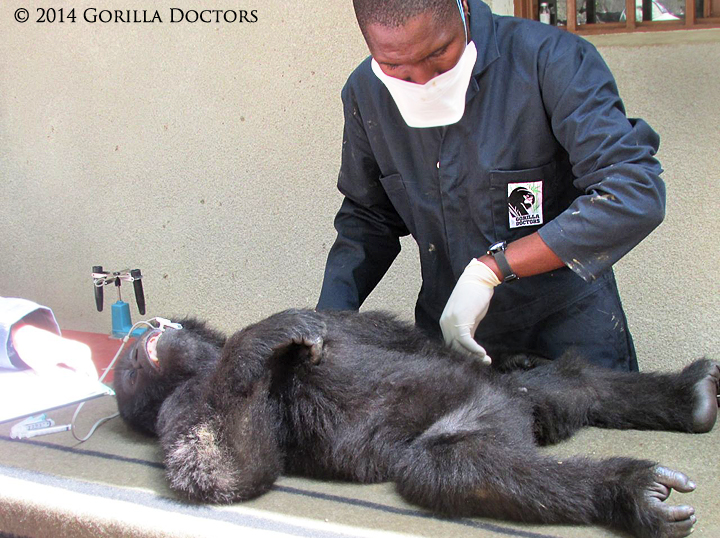
Dr. Eddy checks Matabishi’s pulse during the exam.
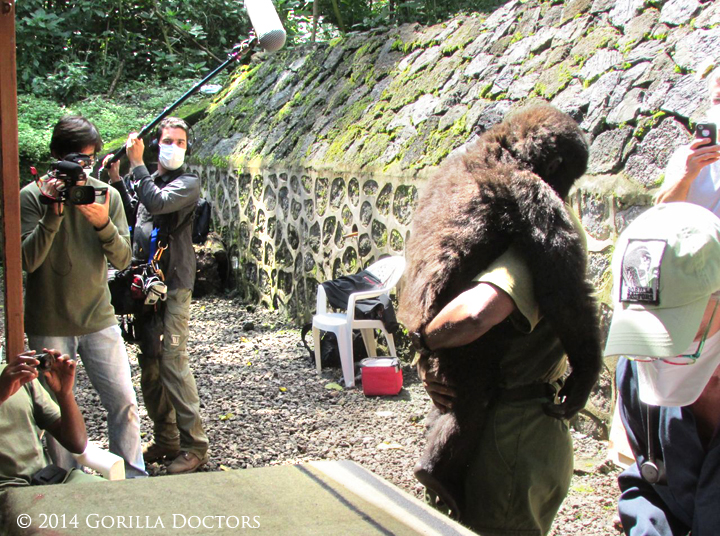
Orphan caregiver Andre Bauma carries Matabishi back to his enclosure after the exam is complete.
Maisha
Maisha was exhibiting some weight loss in November, and reportedly regurgitating her food frequently, licking areas inside her enclosure and occasionally ingesting sand. Fortunately, her energy level was good and she was observed playing vigorously with Ndeze and disciplining Ndakasi during Dr. Jan, Eddy and Martin’s assessment on November 21. The regurgitation behavior is something that Maisha has exhibited since her early days after rescue at the orphan care facility in Kinigi, Rwanda when she was an “only gorilla” for some time, and unfortunately the behavior became a bad habit for Maisha. Of primary concern is that the chronic regurgitation could cause secondary gastritis or esophagitis, so she will continue to be monitored closely. The weight loss could also be attributed to internal parasites and Maisha was given a deworming medication during her exam; a subsequent fecal analysis revealed no parasite infestation. Caregivers were also provided iron and B vitamins to give to Maisha to combat anemia and asked to monitor her for one hour after each treatment to allow the medication time to be absorbed without being regurgitated.
Various husbandry changes were implemented according to Gorilla Doctors recommendation: all of the orphan’s day time food will be scattered throughout the outdoor enclosure so that it encourages the gorillas to engage in more normal foraging behavior and provide more enrichment, more diverse forest food will be provided (bamboo shoots, whole bamboo trees, etc.), new enrichment devices (hammocks, tires, swings) will be installed and varied on a weekly basis, and caregivers are encouraged to intervene and gently distract Maisha after feedings or when engaging in licking and sand ingestion to try to break this bad habit. This is a tough issue to solve, but the Senkwekwe caregivers are working hard to make all of the suggested changes.
Andre Bauma, the head ranger in charge of orphan care, reported recently that Maisha is much improved since receiving veterinary treatment and the husbandry changes have been implemented. She has more energy, is eating well and there is a reduced incidence of regurgitation… All good news!


 Donate
Donate